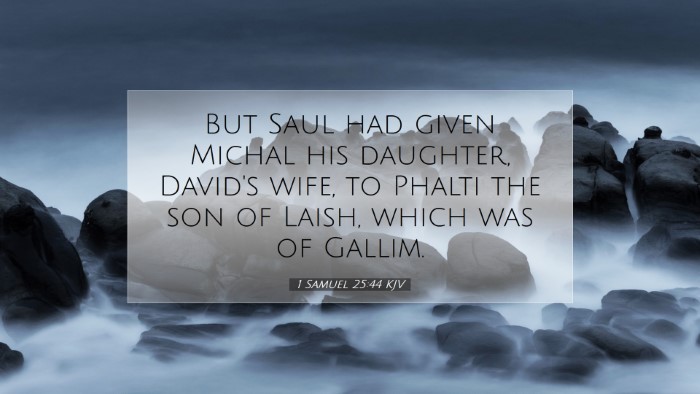Bible Commentary on 1 Samuel 25:44
"But Saul had given Michal his daughter, David's wife, to Phalti the son of Laish, which was of Gallim." (1 Samuel 25:44, KJV)
This verse marks a significant moment in the narrative of David and Saul, particularly in the context of David's relationship with Michal. The implications of Saul's actions have theological, historical, and relational dimensions worth exploring. This commentary synthesizes insights from classical public domain commentaries.
Historical and Theological Background
At this point in the biblical narrative, David is on the run from Saul, who is consumed by envy and a desire to eliminate David as a perceived threat to his throne. This backdrop provides the historical context in which Saul's decision to give Michal to another man must be assessed. Theologically, it raises questions about God's providential care for individuals amidst the tumult of human sin and political intrigue.
Insights from Matthew Henry
According to Matthew Henry, Saul’s action of giving Michal to Phalti signifies his continued animosity towards David. Michal’s relationship with David was not merely a personal bond but also a political alliance. By marrying her off, Saul intended to sever this connection. Henry suggests that this act demonstrates Saul’s attempts to undermine David's rightful claim and influence.
Henry further notes that Michal's situation reflects the broader theme of how individuals are often caught in the turmoil of the conflicts between powerful figures. The personal devastation experienced by Michal is emblematic of many biblical narratives, where the ambitions of rulers profoundly affect the lives of their subjects and families.
Insights from Albert Barnes
Albert Barnes expands on the implications of Michal being given to Phalti. He posits that this act serves to illustrate Saul's desperation to find a way to diminish David's status. Barnes emphasizes that giving Michal to another man would have not only personal ramifications but also, in the customs of the time, would act to nullify her previous marriage to David in the eyes of society.
Barnes adds that the political maneuverings—this act of taking Michal away from David—speak to Saul’s understanding of power dynamics. He notes that such actions were typical of the ancient Near Eastern context, where marriages often served to reinforce political alliances or sever threats. Thus, Michal's marriage to Phalti can be seen as Saul's tactical move to neutralize a rival.
Insights from Adam Clarke
Adam Clarke provides additional perspectives on the social and emotional implications of this event. He highlights that Michal’s forced separation from David likely caused significant emotional distress. Clarke observes that Michal’s love and loyalty were towards David, which adds a tragic dimension to her being given to Phalti.
Clarke also dives into the implications of this event in the larger narrative, alluding to the eventual return of Michal to David, which symbolizes a reconciliation of sorts, although it happens after years of turmoil. This complexity of relationships illustrates God's sovereignty in orchestrating human affairs, even in painful and seemingly hopeless situations.
Theological Implications
Theologically, this narrative invites scholars and theologians to reflect on the nature of divine sovereignty versus human will. While Saul acts out of jealousy and desperation, the text suggests that God is still at work in the midst of chaos. This tension serves as a reminder that God’s purposes cannot be thwarted by human actions, no matter how manipulative.
Additionally, taking a closer look at how relationships are impacted by the sin and folly of leadership gives depth to the character studies within 1 Samuel. The personal tragedies of Michal and David serve as a poignant illustration of the consequences of a leader’s sin, not just for themselves but for those around them.
Conclusion
In conclusion, 1 Samuel 25:44 is a verse rich with implications for understanding the historical, relational, and theological dynamics at play in the lives of its characters. The insights gained from Matthew Henry, Albert Barnes, and Adam Clarke all contribute effectively to a deeper appreciation of these events.
For pastors, students, and theologians, this passage serves not only as a historical account but also as a reminder of the profound impacts our choices can have on others. It underscores the importance of faithfulness in relationships, the weight of leadership, and the overarching sovereignty of God that weaves through the narratives of Scripture.


